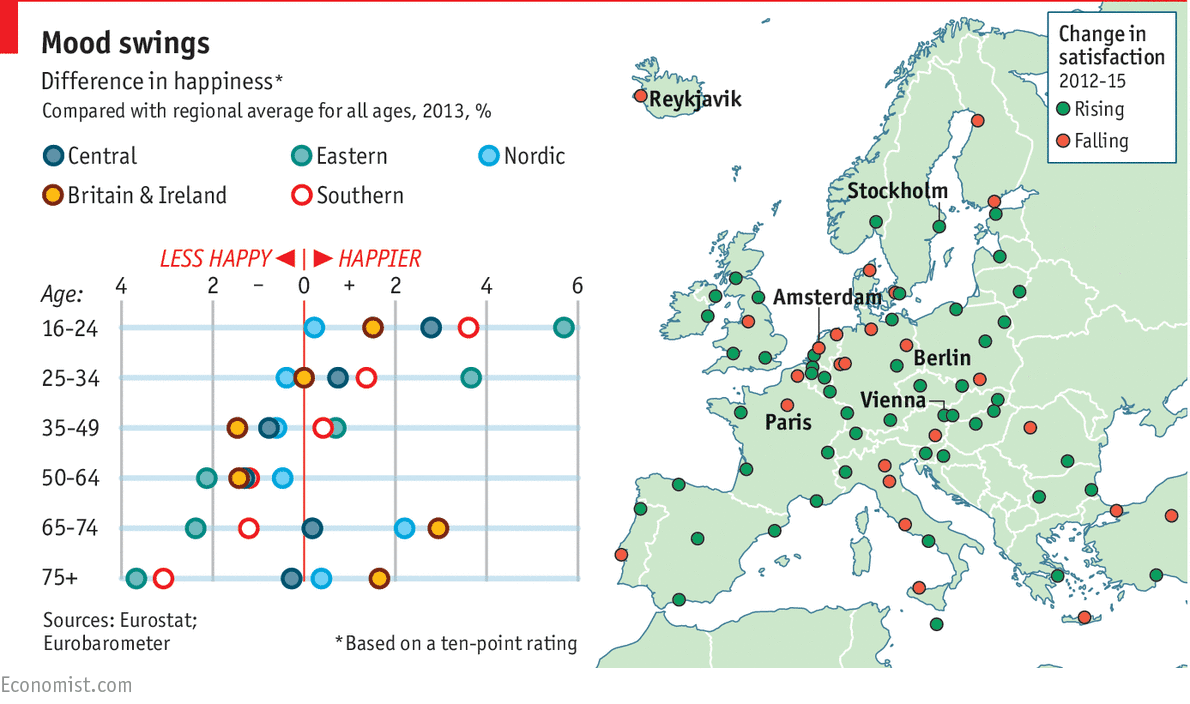Ashura9
JF-Expert Member
- Oct 21, 2012
- 740
- 485
Daily chart
Happiness in Europe

ALTHOUGH there are many reasons for Europeans to feel gloomy at present—from an appalling migration crisis to the possibility that Britain may leave the European Union—many, instead, seem to be becoming ever cheerier. Most Europeans are, on average, at their happiest since the financial crisis. In 2008 76% of EU citizens said they were satisfied with their lives. That number is now 80%, according to the Eurobarometer survey, which has tracked self-reported happiness for over four decades. Those in northern European countries, such as Denmark and Sweden, are consistently the most content.
But there are big differences between individual age-groups. Europeans are generally happier when they are younger. However, richer countries see an uptick of joyfulness in old age: Germans are happier when they are over 75 years old than when they are between 25 and 34, and the Swiss are happier when they are over 75 than when they are teenagers. (Britons, Swedes and Danes are happiest when they are between 65 and 74.)
What makes city-dwellers happier varies from one city to the next. Of the cities surveyed, most are home to populations reporting an increase in happiness over the past few years. The highest correlation with life satisfaction in cities is a feeling of safety. But in Stockholm, Amsterdam and Vienna it is those who think foreigners are well integrated who tend to be happiest. Parisians and Berliners who rate their cities’ cleanliness highly are the most content. In Reykjavik, curiously, the telltale sign of happiness is being satisfied with the public transport system.
Happiness in Europe

ALTHOUGH there are many reasons for Europeans to feel gloomy at present—from an appalling migration crisis to the possibility that Britain may leave the European Union—many, instead, seem to be becoming ever cheerier. Most Europeans are, on average, at their happiest since the financial crisis. In 2008 76% of EU citizens said they were satisfied with their lives. That number is now 80%, according to the Eurobarometer survey, which has tracked self-reported happiness for over four decades. Those in northern European countries, such as Denmark and Sweden, are consistently the most content.
But there are big differences between individual age-groups. Europeans are generally happier when they are younger. However, richer countries see an uptick of joyfulness in old age: Germans are happier when they are over 75 years old than when they are between 25 and 34, and the Swiss are happier when they are over 75 than when they are teenagers. (Britons, Swedes and Danes are happiest when they are between 65 and 74.)
What makes city-dwellers happier varies from one city to the next. Of the cities surveyed, most are home to populations reporting an increase in happiness over the past few years. The highest correlation with life satisfaction in cities is a feeling of safety. But in Stockholm, Amsterdam and Vienna it is those who think foreigners are well integrated who tend to be happiest. Parisians and Berliners who rate their cities’ cleanliness highly are the most content. In Reykjavik, curiously, the telltale sign of happiness is being satisfied with the public transport system.